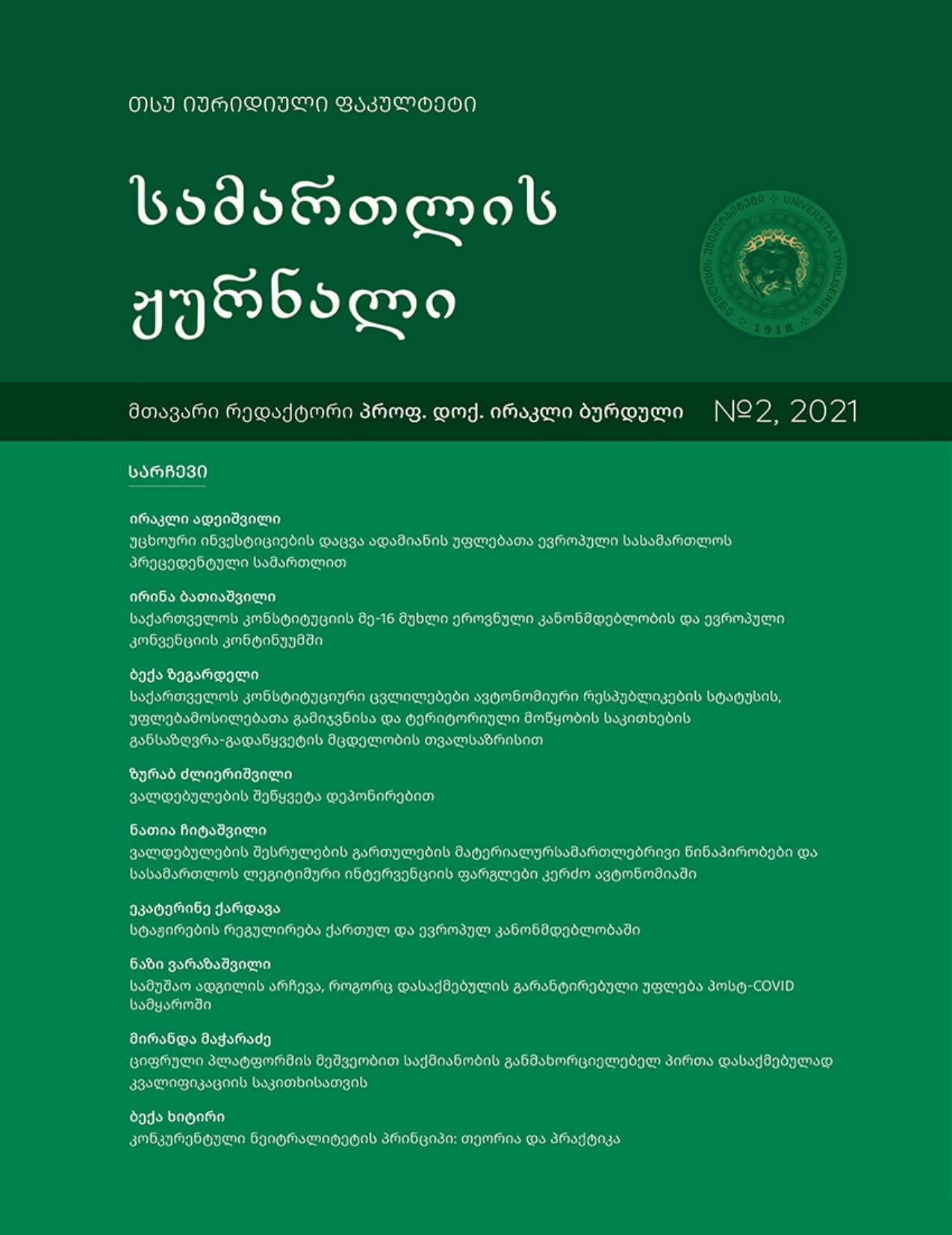ბლოკჩეინის სისტემის ფუნქციონირების ცალკეული კერძოსამართლებრივი ასპექტები
DOI:
https://doi.org/10.60131/jlaw.2.2021.3627საკვანძო სიტყვები:
საკვანძო სიტყვები: ბლოკჩეინი, განაწილებული რეესტრის ტექნოლოგია, ეგზოგენური პრობლემები, ენდოგენური პრობლემები, კეთილსინდისიერი შემძენი, კრიპტოგრაფია, პირადი გასაღები, ტრანზაქციების შეუქცევადობა, საკუთრება, საჯარო გასაღები, ჰეში.ანოტაცია
XXI საუკუნეში კაცობრიობა მეოთხე ― ტექნოლოგიური რევოლუციის წინაშე დგას, რომელიც ციფრული ტექნოლოგიის განვითარების საოცარი ტემპისა და მასშტაბებით გამოირჩევა. ამ რევოლუციის განმაპირობებელი კი ბლოკჩეინ ტექნოლოგიაა, რომელიც დღესდღეობით ერთ-ერთი ყველაზე აქტუალური, განხილვადი და პერსპექტიული სისტემაა და ახალი ციფრული ეკონომიკის ფუძემდებლადაც გვევლინება.
ნაშრომის მიზანია, მკითხველისათვის ბლოკჩეინ ტექნოლოგიის არსისა და სტრუქტურის გაცნობა, ბლოკჩეინ სისტემის გაანალიზება კერძოსამართლებრივ ჭრილში, კერძოდ, საკუთრების უფლების, განაწილებული რეესტრის ტექნოლოგიის (შემდგომში ― DLT) განხორციელებული ტრანზაქციებით გამოწვეული კერძოსამართლებრივი ენდოგენური და ეგზოგენური პრობლემების განხილვა, ბლოკჩეინ სისტემის ავტონომიურობის შეპირისპირება ეროვნულ კანონმდებლობასთან, საკანონმდებლო ალტერნატივის შეთავაზება ბლოკჩეინსისტემის სამართლებრივი მოწესრიგებისათვის, ტექნოლოგიებისა და სამართლის სიმბიოზური თანაარსებობის აუცილებლობის დადგენა და ამ თანაარსებობისთვის აუცილებელი კომპრომისების გამოსანახი გზის შეთავაზება.
წყაროები
Hague Convention on the Law Applicable to Certain Rights in Respect of Securities Held with an Intermediary Art, 05/06/2006.
Abramowicz M., Cryptocurrency-Based Law, USA, 2016, 414.
Anitei A. C., Digital Inheritance: Problems, Cases and Solutions, International Conference Education and Creativity for a Knowledge-Based Society, 2017, 32.
Agrawal H., How Long Does It Take to Transfer Bitcoins and Why?, Coinsutra, 2019, <https://coinsutra.com/bitcoin-transfer-time/> [25.12.2021].
Bayer D., Haber S., Stornetta W. S., How to time-stamp a digital document, Journal of Cryptology, № 3, 1991, 99–111.
Bayer D., Haber S., Stornetta W. S., Improving the Efficiency and Reliability of Digital Time-Stamping, 1992, 325, 329–334.
Bayern S., Dynamic Common Law and Technological Change: The Classification of Bitcoin, USA, 2014, 22, 29.
Buterin V., Bitcoin Network Shaken by Blockchain Fork, USA, 2013, 7.
Cahn N., Probate Law Meets the Digital Age, USA, 2014, 67.
Campbell B. H., A Treatise on the Law and Practice of Bankruptcy: The Act of Congress of 1998 and its Amendments, 3rd ed., Kansas City 1922, 4.
Rose C. M., Possession as the Origin of Property, USA, 1985, 84-85.
Cutts T., Bitcoin Ownership and Its Impact on Fungibility, USA, 2015, 23.
De Filippi P., Mcmullen G., Governance of Blockchain Systems: Governance of and by Distributed Infrastructure, USA, 2018, 16, 24, 44.
De Waal M. J., Law of Succession, in Introduction to the Law of South Africa, 2004, 169.
Dyson H., French Property and Inheritance Law: Principles and Practice, USA, 2003, 313.
Fawcett J. C., Cheshire N. F., Private International Law, USA, 2008, 85.
Garrison J., 2 Men Arrested in Elaborate Plot to Steal $550K in Cryptocurrency by Hacking Social Media Accounts, USA Today, 2019, <https://www.usatoday.com/story/news/nation/2019/11/15/massachusetts-men-arrested-plot-steal-cryptocurrency-bitcoin-social-media-threats/4201763002/> [24.12.2021].
Gomez E., The Ethereum Hard Fork & Ethereum Classic, USA 2016, 11.
Kekelia V., Kotrikadze G., Methods and Models of Symmetrical System of Blockchain, Book I, Tbilisi, 2016, 4 (in Georgian).
Kotrikadze K., Kipshidze D., Blockchain Technologies, as Self-Organized Systems, Tbilisi, 2019, 1-2 (in Georgian).
Low K., Teo E., Legal Risks of Owning Cryptocurrencies, Handbook of Blockchain, Digital Finance and Inclusion, USA, 2018, 47.
Lansiti M., Lakhani K. R., The Truth About Blockchain, Harvard Business Review, Januar-February, 2017, 1.
Lessig L., Code is Law, USA, 2000, 4-6.
Lessig L., Code: Version 2.0, USA, 2006, 1-8.
Levy S., Crypto: How the Code Rebels Beat the Government Saving Privacy in the Digital Age, USA, 2001, 78-79.
Mcgovern Jr. W., Kurtz S., Eenglish D. M., Wills, Trusts and Estates, Including Taxation and Future Interests, USA, 2010, 57.
Meiklejohn S., A Fistful of Bitcoins: Characterizing Payments Among Men with No Names, IMC'13 – Proceedings of the 13th Conference on Internet Measurement, USA, 2013, 127.
Miranda C., How to Avoid a Bitcoin Blackmail Scam, USA, 2018, 8.
Nakamoto N., Bitcoin: A Peer-to-Peer Electronic Cash System, Decentralized Business Review, October, 2008, 1-3, 8.
Siraj R., What Is a Decentralized Application, USA, 2016, 1-2.
Tu K., Perfecting Bitcoin, USA, 2017, 505, 548.
Raskin M. I, Realm of the Coin: Bitcoin and Civil Procedure, Fordham Journal of Corporate & Financial Law, Vol. 20, Issue 4, 2015, 969, 975.
Weintraub J., Functional Developments in Choice of Law for Contracts, Germany, 1984, 239, 271.
Wright A., De Filippi P., Decentralized Blockchain Technology and the Rise of Lex Cryptographia, USA, 2015, 37, 45, 48.
Zaytoun H., Cyber Pickpockets: Blockchain, Cryptocurrency, and the Law of Theft, USA, 2019, 395, 401.
Case of Miller v. Race, England, 1758.
HashFast Technologies LLC v. Lowe, (2016), 307 US 25.
[26.12.2021].
<https://www.investopedia.com/terms/g/genesis-block.asp> [04.02.2022].
<https://www.bbc.com/news/technology-56371912> [04.02.2022].
<https://www.gemini.com/cryptopedia/public-private-keys-cryptography#section-what-is-public-key-cryptography> [04.02.2022].
<https://www.statista.com/statistics/730806/daily-number-of-bitcoin-transactions/> [26.12.2021].
ჩამოტვირთვები
გამოქვეყნებული
როგორ უნდა ციტირება
გამოცემა
სექცია
ლიცენზია
საავტორო უფლებები (c) 2021 Mariam Chilachava

ეს ნამუშევარი ლიცენზირებულია Creative Commons Attribution-ShareAlike 4.0 საერთაშორისო ლიცენზიით .









